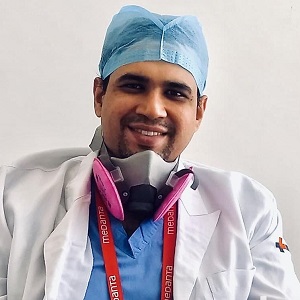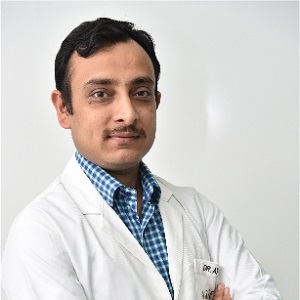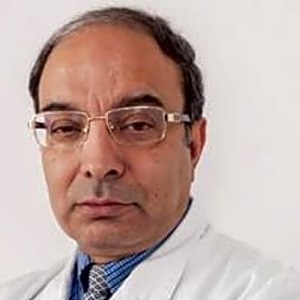Best Doctors in India for Alcoholic Hepatitis Treatment
- Neurosurgeon, New Delhi, India
- Over 30 years’ experience
Profile Highlights:
- With a super-specialization in Neurosurgery, Dr. S K Sogani is one of the most accomplished neurosurgeons in Delhi and NCR.
- His interest lies in tumor removal surgery, skull base surgery, brain stroke surgery, head injury, micro neurosurgery, different types of spine surgery, and emergency trauma surgery.
- Dentist, Gurugram, India
- Over 10 years’ experience
Profile Highlights:
- Dr. Ankur Rustagi has over 10 years of specialized practice in Dental implants and Maxillofacial surgery.
- He was the first batch of students who pursued post-graduation in Oral & Maxillofacial Surgery from AIIMS, New Delhi.
- Dr. Rustagi has successfully treated over 5000 patients with simple and complex dental and implant requirements, jaw fractures, and orthognathic and TMJ problems.
- Dentist, Gurugram, India
- Over 10 years’ experience
Profile Highlights:
- Dr. Ateksha Bhardwaj is a dental surgeon who specializes in Cosmetic And Restorative Dentistry.
- She is an alumnus of King’s College, London from where she has successfully completed her Masters in Endodontics.
- She has a special interest in Restorative and Cosmetic Dentistry and has undergone various certification courses to restore teeth with the optimum aesthetic value from King’s College London.
- ENT, Head & Neck Surgeon; Gurugram, India
- Over 15 years’ experience
Profile Highlights:
- Dr. Anish Gupta is a renowned ENT specialist and Head & Neck Surgeon in Delhi/ NCR.
- He has extensive experience in performing common and complex ENT procedures including ontological and rhinological procedures, laryngeal framework procedures, endoscopic sinus surgery, cochlear implant, thyroidectomy, and surgical treatment for head and neck tumors.
- Dr. Anish Gupta has been involved in more than 100 cochlear implant surgeries.
- Eye Surgeon, Ophthalmologist, New Delhi, India
- Over 20 years’ experience
Profile Highlights:
- Dr. Nikhil Pal did a vitreoretinal fellowship from the University of Wisconsin, Madison, USA.
- As a Senior resident, Dr. Nikhil Pal has independently performed various basic as well as advanced Vitreoretinal surgeries including retinal detachment, vitreous hemorrhage, macular hole, dropped nucleus removal, and gained expertise in medical retina involving Fluorescein angiography/Lasers for diabetic retinopathy, ARMD, vasculitis, ROP and Phacoemulsification cataract surgery among others.
- Nephrologist, New Delhi, India
- Over 20 years’ experience
Profile Highlights:
- Dr. Rahul Grover is known to be one of the finest renal doctors and nephrologists in New Delhi. He offers excellent care to all his patients.
- He holds an experience of several years and has extensive knowledge in the field of medicine.
- He is also an esteemed member of the Indian Society of Nephrology (ISN), and the Indian Society of Organ Transplantation (ISOT), and this further adds to his credibility.
- Plastic & Cosmetic Surgeon, Gurugram, India
- Over 15 years’ experience
Profile Highlights:
- Dr. Avinash Agarwal is a well-known cosmetic surgeon in Delhi/ NCR. He has been trained and worked under an esteemed faculty of the prestigious Dayanand Medical College and Hospital, Ludhiana.
- He has experience in operating on all types of maxillofacial injuries, traumatic upper and lowers limb injuries including tendon repair and microvascular repair of nerve and vessels, reconstructive surgeries including free flaps, various cosmetic surgeries including abdominoplasty, gynaecomastia correction, reduction of mammoplasty, breast augmentation, liposuction, hair restoration, etc.
- Dermatologist, Gurugram, India
- Over 6 years’ experience
Profile Highlights:
- Dr. Manan Mehta has been one of the top Dermatologists in India who excelled in treating patients with his couple of years of experience.
- He is an expert in diagnosing patients with Autoimmune Skin Disorders and other complicated cases and treating them successfully.
- Dr. Mehta has treated not only Indian patients but patients from different corners of Southern Asia.
- Nephrologist, Gurugram, India
- Over 15 years’ experience
Profile Highlights:
- Known as one of the best nephrologists in the NCR region, Dr. Manish Jain holds a special interest in renal transplants as well as clinical nephrology.
- His compassionate patient care and lifestyle advocacy have helped patients recover from various disorders.
- Throughout his career, Dr. Manish Jain has published several papers in India and is also a member of several medical associations.
- Nephrologist, Gurugram, India
- Over 31 years’ experience
Profile Highlights:
- Dr. Vijay Kher is a well-known nephrologist with over 31 years of experience. He did his MBBS from Glancy Medical College, Amritsar. He completed his DNB – General Medicine from the Postgraduate Institute of Medical Education and Research, Chandigarh in 1977.
- Some of the services provided by Dr. Kher are ABO Incompatible Transplantation, Steroid Free Immunosuppression, Clinical Immunosuppression, Kidney Disease Treatment Acute Renal Failure, etc.
Best Hospitals in India for Alcoholic Hepatitis Treatment
ALCOHOLIC HEPATITIS
Alcoholic hepatitis is a liver infection, which is mainly caused by frequent, heavy use of alcohol. Fat can build up in the liver cells, which might lead to inflammation as well as scarring of the liver.
Alcoholic hepatitis might be mild or severe. A patient might even need a liver transplant if proper treatment is not provided, or if they don’t stop consumption of alcohol.
It is also notable that all heavy drinkers don’t develop this condition, and sometimes this condition even develops in people who drink moderately. However, if you are diagnosed with this condition, it is important for you to quit drinking alcohol. People who continue drinking alcohol might face a huge risk of serious liver damage as well as death.
Symptoms
Depending on the amount of damage to the liver, the symptoms can vary. If you are having a mild form of the disease, you might not even experience any symptoms at all. However, as the damage continues to grow, you might experience the following:
- Changes in appetite
- Dry mouth
- Weight loss
- Pain or swelling in the abdomen
- Jaundice, or yellowing of the skin or eyes
- Fever
- Nausea and vomiting
- Easy bleeding or bruising
- Changes in your mental state, including confusion
- Fatigue
The symptoms of this condition are similar to those caused by a few other health conditions. Therefore, if you develop any of these symptoms, it is best to get a proper diagnosis as well as begin treatment.
Causes & risk factors
Alcoholic hepatitis generally develops when the alcohol you drink causes damage to your liver. However, it is not clear why alcohol does this damages only to some heavy drinkers.
Few factors that are known to play a role in this condition include:
- The body’s process that breaks down alcohol produces some toxic chemicals
- These chemicals can trigger inflammation that can destroy the liver cells
- Thus, over time, scars replace healthy liver tissue, thus interfering with the function of the liver
- This irreversible scarring, which is also termed cirrhosis, is the final stage of alcoholic liver disease
If you have hepatitis C and continue to drink, even moderately, you are more likely to develop cirrhosis.
Some heavy drinkers are also malnourished because they don’t eat a proper balanced diet. Alcohol and its byproducts also prevent the body from absorbing nutrition properly. Lack of nutrition can contribute to liver cell damage.
Some other risk factors that can lead to this condition include:
- Your sex- Women are usually at a higher risk of developing alcoholic hepatitis since the way alcohol is processed in women is different.
- Binge drinking- Having over five drinks within two hours for men and four or more for women can increase the risk of alcoholic hepatitis.
- Obesity- Heavy drinkers who are overweight are also more likely to develop alcoholic hepatitis and to progress from that condition to cirrhosis.
- Race and ethnicity- Hispanic and Negroid people might be at higher risk of alcoholic hepatitis.
- Genetic factors- According to studies, there may be a genetic component in alcohol-induced liver disease. However, it is difficult to separate genetic and environmental factors.
Diagnosis
If you are showing symptoms of alcoholic hepatitis, your doctor will first inquire about your medical history and alcohol consumption. Next, he/she will perform a physical exam to see if you have an enlarged liver or spleen. They might also need a few more tests to confirm your diagnosis, such as:
- Complete blood count (CBC)
- Liver function test
- Ultrasound of the liver
- Abdominal CT scan
- Blood clotting tests
In some cases, a liver biopsy might also be needed to confirm the diagnosis of alcoholic hepatitis. A liver biopsy requires your doctor to remove a tissue sample from your liver, which is then tested in the lab. This method helps to show the severity and type of liver disease.
Treatment
Stopping alcohol consumption is the most important treatment for alcoholic hepatitis. There is no cure for this condition, but treatment can help in reducing or eliminating symptoms, or stopping its progression.
It is also important to note that scarring of the liver is permanent, but treatment can aim to restore as much function as possible.
Dietary changes
Medication
Liver transplant
The best hope of recovery is to be aware of the signs and symptoms as well as to reduce, manage, or if possible, completely stop consumption of alcohol.
Complications
Alcoholic hepatitis might lead to severe other complications such as:
- Enlarged veins (varices)- In this condition, blood that is unable to flow freely through the portal vein, can back up into other blood vessels in your esophagus or stomach.
- Hepatic encephalopathy- This condition can be caused by the buildup of toxins if your damaged liver is unable to remove all the toxins from your body. It involves confusion, drowsiness, and slurred speech.
- Ascites- Ascites is a condition in which the fluid that accumulates in the abdomen may get infected and thus, require treatment with antibiotics. Although this condition is not life-threatening, it can be a sign of advanced alcoholic hepatitis, or cirrhosis.
- Kidney failure- A damaged liver affects blood flow to the kidneys, thus resulting in kidney failure.
- Cirrhosis- The scarring of the liver might lead to liver failure.
Prevention
Alcoholic hepatitis might be prevented if you take the following steps:
- Drink alcohol in moderation, if at all- For healthy adults, moderate drinking means no more than one drink a day for women of all ages and men older than 65, and not over two drinks a day for men aged 65 and younger. However, if you prevent all alcohol, it is a certain way to prevent this condition.
- Check before mixing medications and alcohol- Ask your doctor if it’s safe to drink alcohol while you are taking medications. Consider reading the warning labels on over-the-counter medications as well. Don’t drink alcohol when you are taking medications that warn of complications when combined with alcohol.
- Protect yourself from hepatitis C- Hepatitis C is an infectious liver disease that is caused by a virus. If it is left untreated, it may lead to cirrhosis. If you are having hepatitis C and you consume alcohol, you’re generally more likely to develop cirrhosis than if you don’t drink.















